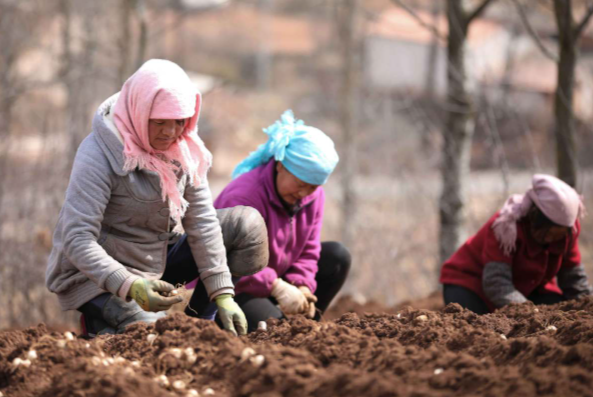Thinking outside the box, villagers in Gansu profit from rare lilies

"Is everybody OK?" Gao Zuowang asked as he began his livestreaming show in clumsy but enthusiastic English ahead of this year's Spring Festival.
The former Party secretary of Yuanjiawan in Gansu province, Gao was hosting an online promotional event featuring the village's new specialty-a soil-filled "blind box" with local agricultural products inside.
Blind boxes, mostly containing cartoon figurines, are all the rage in China, with the size of the market expected to exceed 30 billion yuan ($4.59 billion) by 2024, according to a recent industry report.
Yuanjiawan's blind box is 10 times bigger than ordinary ones, and buyers use a mini shovel to find out what exactly is hidden in the soil.
Apart from tomatoes, pumpkins and common vegetables, buyers can dig up edible sweet lilies, a rare breed cultivated in Yuanjiawan for over 100 years.
The unique garlic-shaped white lilies grow in soil with high-drainage capacity in areas 2,000 meters above sea level.
In the past, only the rich could afford the plant, which takes nine years to fully mature.
The village has 200 hectares of lily plantations, which generated revenue of 30 million yuan last year. The procedure involved in growing the lilies has been identified as an intangible cultural heritage of Gansu.
Gao came up with the blind box idea after being inspired by his daughter, who is a fan of them. He wanted to attract more young consumers who rarely pay attention to traditional food items, despite their rich nutritional value.
It's not the first time Gao has adopted modern strategies to promote the village to the outside world. Under his guidance, Yuanjiawan started selling its products on Alibaba's Tmall in 2013 when poor local infrastructure limited the amount of sales that could be made through traditional channels.
Sales on Tmall have jumped from 100,000 yuan in 2014 to about 6 million yuan today, and the village has continued to develop more products such as lily porridge and chips. Gao Lianhai, director of a lily cultivation cooperative, said that almost 80 percent of its 5.5 million yuan in sales came from online stores last year.
The 43-year-old also upgraded his sales strategy by shooting humorous videos and posting them on short-video platforms. "I gained more than 1,000 followers within two months," he said with pride.
The village has established a professional team in e-commerce management and operation. Besides quality, they also pay attention to branding, as all products are packed in specially designed paper boxes.
Many people working in the village who chose to stay put during the Spring Festival holiday sent gift boxes of lilies to their families, said Gao Yanling, manager of a marketing company.
Meanwhile, young customers are also on the rise.
Wang Ying, 23, said her friends from outside the area often ask her to courier them lily products, especially those packed in beautiful boxes.
From attractive packaging to blind boxes, Yuanjiawan's exploration of novel marketing strategies has greatly improved the lives of locals. Currently, 70 percent of the village's 280 households earn an annual income of more than 100,000 yuan, and each family owns at least one car.
Yuanjiawan is also developing lily-themed tourism by turning some plantations into scenic parks.
"In July, our lilies will bloom like fireworks. I'm looking forward to seeing tourists from near and far," Gao Zuowang said.
Editor:李玥莹
